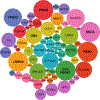The commercial genetic testing landscape for Parkinson's disease
- PMID: 34696975
- PMCID: PMC8633166
- DOI: 10.1016/j.parkreldis.2021.10.001
The commercial genetic testing landscape for Parkinson's disease
Abstract
Introduction: There have been no specific guidelines regarding which genes should be tested in the clinical setting for Parkinson's disease (PD) or parkinsonism. We evaluated the types of clinical genetic testing offered for PD as the first step of our gene curation.
Methods: The National Institutes of Health (NIH) Genetic Testing Registry (GTR) was queried on 12/7/2020 to identify current commercial PD genetic test offerings by clinical laboratories, internationally.
Results: We identified 502 unique clinical genetic tests for PD, from 28 Clinical Laboratory Improvement Amendments (CLIA)-approved clinical laboratories. These included 11 diagnostic PD panels. The panels were notable for their differences in size, ranging from 5 to 62 genes. Five genes for variant query were included in all panels (SNCA, PRKN, PINK-1, PARK7 (DJ1), and LRRK2). Notably, the addition of the VPS35 and GBA genes was variable. Panel size differences stemmed from inclusion of genes linked to atypical parkinsonism and dystonia disorders, and genes in which the link to PD causation is controversial.
Conclusion: There is an urgent need for expert opinion regarding which genes should be included in a commercial laboratory multi-gene panel for PD.
Keywords: Clinical laboratories; Genetic testing; Multi-gene panels; Parkinson's disease.
Copyright © 2021 The Author(s). Published by Elsevier Ltd.. All rights reserved.
Conflict of interest statement
Declaration of competing interests: None
Figures


References
-
- Skrahina V, Gaber H, Vollstedt E-J, Förster TM, Usnich T, Curado F, Brüggemann N, Paul J, Bogdanovic X, Zülbahar S, Olmedillas M, Skobalj S, Ameziane N, Bauer P, Csoti I, Koleva-Alazeh N, Grittner U, Westenberger A, Kasten M, Beetz C, Klein C, Rolfs A, ROPAD Study Group, The Rostock International Parkinson’s Disease (ROPAD) Study: Protocol and Initial Findings, Mov Disord. 36 (2021) 1005–1010. 10.1002/mds.28416. - DOI - PMC - PubMed
Publication types
MeSH terms
Grants and funding
LinkOut - more resources
Full Text Sources
Medical
Miscellaneous

